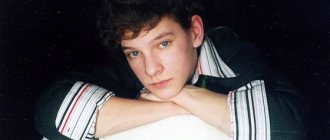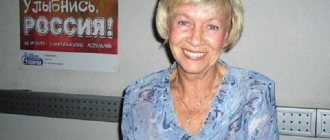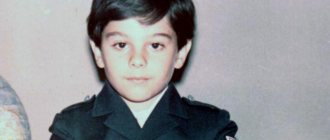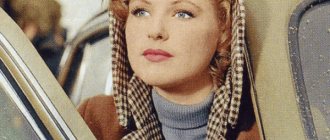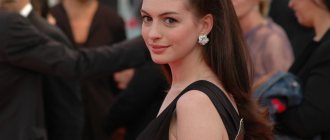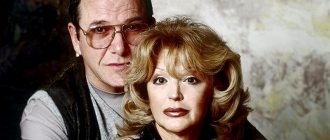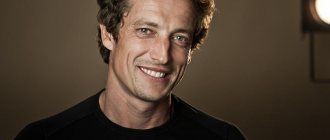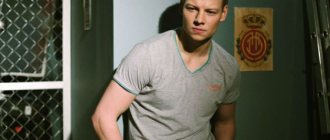Biography
Dmitry Iosifov was born into a simple Soviet family that had nothing to do with the acting profession or art in general. He says about his loved ones: “I was born and lived in Minsk, my dad worked as a mechanical engineering design engineer. Mom is a biologist, she worked at the Institute of Sanitation and Hygiene, Ph.D. There are three children in our family: brother Andrei is two years older than me, and Nikolai is 12 years younger. They have been interested in mathematics since childhood, and now they work as programmers.”
The boy was interested in photography from an early age and enjoyed attending the figure skating section. Nothing promised him to become an artist, but by the will of fate, in 1974 he ended up filming the children's film “The Adventures of Pinocchio.”
Later, in an interview, the actor clarified how this happened: “In Minsk, where I’m from and where the film was filmed, they announced a recruitment. They found me at a figure skating school and brought me to the studio. At first I really didn’t like everything, and I told my grandmother, with whom I came, that my stomach hurt. But they brought me in a second time and cast me in the role of Harlequin. Then a problem arose with the main characters - Pinocchio and Malvina; they could not find them for a long time. That’s when the second director offered to try me.”
So Dima, unexpectedly for himself, became acquainted with the acting profession. After the release of the film, dizzying success awaited him. But, despite this, after graduating from school, on the advice of his dad, the young man still wanted to enter the Polytechnic Institute and connect his life with powder metallurgy. However, the acting bacillus was already firmly seated in the young man. And director Leonid Nechaev strongly recommended that he go to the theater. With his blessing, Dmitry entered the Institute of Cinematography. Gerasimov on the course of Alexey Batalov. And later he graduated from the directing department of the Academy of Arts in Belarus.
At the same time, the young artist worked at the Minsk Theater-Studio of Film Actors, where he played many roles. He also began to try himself in other capacities - need forced him: “After graduating from university, the 90s came, cinema stopped for 10-15 years, nothing was filmed. The entire generation had one desire - to survive. Whatever he did then: he hosted parties for pennies, worked in advertising, began making projects for TV.”
KisTv
Born 10/22/1965, Minsk
Actor, screenwriter, director. "Pinocchio"
Dima's parents had nothing to do with art - dad was an engineer, mom was a biologist. And Dima himself didn’t dream of cinema either; he spent most of his free time in the figure skating section. It was during one of these classes that the assistant director of the Belarusfilm studio found him. Dmitry Iosifov recalls: “In Minsk, where I’m from and where the film was filmed, they announced a recruitment. They found me at a figure skating school and brought me to the studio. At first I really didn’t like everything, and I told my grandmother, with whom I came, that my stomach hurt. But they brought me in a second time and cast me in the role of Harlequin. Then a problem arose with the main characters - Pinocchio and Malvina; they could not find them for a long time. It was then that the second director offered to try me. Nechaev still denies this, but I know for sure that he refused. Nevertheless, they began to try me. We tried our noses on for a long time - we couldn’t choose which size was better. We tried and tried, and after three months I asked: “Why, will there be filming?” Everyone burst out laughing, because it turns out that the film had already been filmed all this time.” Filming took place in Crimea for 98 days. It was a blessed time - summer, and all the actors got a lot of pleasure from this work. True, it was not easy for Dima at first - for a long time he could not get used to the long nose that the make-up artists pasted on him for a whole hour. However, his grandmother was always nearby, who did her best to calm her grandson down. When the film was released on the silver screen, its success with the audience was unconditional. Most of the lines spoken from the screen by the characters in the film immediately went to the people. Here are just a few of them: “give me just three crusts of bread”, “rich Pinocchio”, “I’ll grab you in the face right now”, “what a blue sky”, etc.
Other film roles
If the film “The Adventures of Pinocchio” did not change, then at least it changed the boy’s life, that’s for sure. “After the movie, everything else became uninteresting to me,” he recalls. Offers to act began to come to him one after another. I had to give up figure skating forever. Until the end of the decade, Dima managed to star in a number of children's films, among which the most famous were: “About Little Red Riding Hood,” where he played a wolf cub, and “Captain Rip-off the Head” - Monsieur Komarov.
Who to be?
Despite his success in cinema, after graduating from school, Dmitry was going to enter the polytechnic and connect his life with powder metallurgy. Why? Dmitry says: “Everything is explained simply. Although after “The Adventures of Pinocchio” there were other roles, my parents did not believe that acting was really for me. Therefore, my father, who worked as an engineer in mechanical engineering, actively involved me in “serious” business. When I was in tenth grade, he received an order from the Poles to design some kind of unit. Since I respected my father very much, I immediately came to his aid: I spent a whole year making drawings—I probably sculpted fifty Whatman papers. The Poles, apparently, were satisfied, and we earned good money and invested it in our dacha - such a family contract. So there was nothing surprising in the fact that I chose metallurgy. But I never made it to the institute.” It was at this moment that fate gave him a sign. Exams at the Polytechnic were in August, and the boy still had plenty of time. Then Dmitry decided to go to Moscow and try his luck at a creative university. He was lucky; the director of “Pinocchio” Leonid Nechaev literally led him by the hand to VGIK. But the young man, one meter fifty-eight tall, made no impression on anyone. And then Nechaev acted as his guarantor. He decisively told the selection committee: “The boy will grow up, I promise you.” Dmitry was accepted into the group, which was recruited by Alexey Batalov. And he lived up to his teacher’s hopes - he grew both creatively and literally (by as much as 22 centimeters!).
Personal life
Dmitry Iosifov met his future wife Natalya by chance. Here’s what he says himself: “We met Natalya at the Institute of Steel and Alloys: I brought my brother’s documents to the admissions office, and she tried to enroll. At first it was a non-binding connection: I saw an interesting girl and decided to talk to her. However, pretty soon our relationship turned into something more. And after some time, Natasha - together with my brother, by the way - was expelled from the institute. Hers - because of her affair with me, and his - because of his affair with the theater (my brother constantly went to all the premieres, and he had no time left for studying). Then my brother went into the army, and a year later Natalya again entered the same institute, but in a different department. By the way, she generally easily entered any educational institution and left them with the same ease - she was not interested...” It soon became clear that Natalya was expecting a child. Dmitry was young and completely unprepared for such a turn. It was 1986. Iosifov had just graduated from VGIK and was assigned to Minsk. He left, leaving his girlfriend in the position. They lived apart for six months, and then Dmitry’s soul could not stand it. He came to Moscow and begged Natalya’s forgiveness and consent to become his wife. He returned back to Minsk not alone.
"Adult" cinema
In his native Minsk, Dmitry Iosifov worked in one of the theaters for six years. At that time, he starred a lot at various film studios, but most of all the roles he played were in the films of the Lenfilm studio. Moreover, he mostly had to play police officers in various detective stories. The actor himself considers his best work to be his role in Alexander Rogozhkin’s film “Guard.” This is a gloomy picture about hazing in the army, based on materials from a real criminal case, when a young soldier of the internal troops on a train for transporting prisoners shot the entire guard. Iosifov played the role of one of the “grandfathers” in this film. Dmitry recalls: “I played the role of one of the animal sergeants and received, perhaps, the best compliment in my entire acting career. When this film was shown at one of the closed screenings, a soldier came up to me, grabbed me by the breasts and said: “I had the same bastard in the army.” I was pleased with such a rude reaction, it meant that I was able to play my role very authentically, despite the fact that I myself did not serve in the army.” The film was awarded several prestigious prizes: “West Berlin-90”, “Strasbourg-90”, “Stalker-95”.
Directing
In the mid-90s, Dmitry entered the directing department of the film department of the Belarusian Academy of Arts (workshop of V. Turov). Immediately after graduation, he left the theater and began working in advertising, which was actively developing at that moment. One day his VGIK classmate Andrei Lobov saw his videos. “Where did you film this, in America?” he asked. “No, in Minsk.” Andrey was very surprised and offered to do something for Moscow customers, and after a while he persuaded him to move to Moscow. Dmitry Iosifov recalls: “By that time, Lukashenko had come to power in Belarus, and I realized: that’s it, the country is finished, I have to leave.” In Russia, Dmitry has shot a lot of commercials; at the moment, his creative assets already include about 40 (advertising juices, shoes, etc.). Later television projects and films appeared. Dmitry worked as a director on “The Last Hero” and “Twelve Little Indians”. And in 2005, Iosifov acted as director of the famous series “Deadly Force.” Dmitry directed the three-episode block “Cape of Good Hope”, as well as the series “Brotherhood in Arms”. The new cycle tells about the adventures of operas in Africa. Dmitry Iosifov says: “This project was truly special for me. The filming was very easy and dynamic. After all, their place was Africa - and the adrenaline “worked” at full power. Moreover, for the first time, “Deadly Force” continues in a completely new genre - now it is an eccentric comedy, sometimes even ridiculous. And there were still unforgettable feelings from working with Khabensky. He can depict anything. Incredibly organic!” His wife was with Dmitry in Africa. Natalya worked as a costume designer in the “Deadly Force” project. There, the couple’s third son, Artem, was born.
Pinocchio forever
Today Dmitry Iosifov and his wife live in Moscow. As already noted, they have three sons. The eldest, Andrey, studies at VGIK in the camera department. The middle one, Anton, born in Minsk, is still a schoolboy. The youngest is Artem. Despite the years that have passed, many recognize in Dmitry Iosifov the much-loved Pinocchio. He is surprised: “It seems that that role will haunt me all my life. To this day, when I get on public transport, people point fingers at me. How they manage to recognize me, I can’t even imagine. But today I treat this with irony. After all, so many years have passed.”
Cinema
"The Adventures of Pinocchio"
The starring role of a cheerful adventurer turned Dmitry's whole life upside down and became the starting point of his future biography. Meanwhile, back in the 70s, parents bought their son a bicycle and a large record player using his salary from work. But the main asset was the people with whom my friendship has lasted for many years.
The actor emphasizes: “The most important thing for me was meeting my peers, with whom I am still friends. Tanya Protsenko, our Malvina, who is two years younger than me and Pierrot, graduated from the film studies department of VGIK. She got married and changed her last name to Vaityuk, gave birth to two children. And although she is now a housewife in her house in the village of Vnukovo, this does not stop her from writing books. She has already released a collection of poems. And recently Tatyana accompanied her eldest son to Baikal, where he starred with Sergei Bezrukov.
We talk on the phone every week with Roma Stolkarets, who played Pierrot in the fairy tale; he works as a pediatrician in Israel. It’s not possible to meet him often, but we are family friends. It so happened that Roma did not get married for a long time, and then one day he and his wife Maya had four children. The eldest daughter, Nissan, is almost a girl, the middle boys are in school, and the youngest girl is only three years old.”
On the set, the young artist had the opportunity to work in the same frame with such masters of Russian cinema as Rolan Bykov, Vladimir Etush, Elena Sanaeva, Vladimir Basov, Rina Zelenaya, Yuri Katin-Yartsev. Dmitry felt most comfortable next to his on-screen “dad.” He recalls: “What I remember most is Nikolai Grinko, a wonderful guy who played Papa Carlo. I learned decent acting behavior from him. Although it was difficult to call him an actor on set. He was always invisible, appeared on the site when needed, and then disappeared. Next to him I felt like I was behind a stone wall. If I were to say that there is any example of a male actor, it would probably be Grinko.”
More than forty years have passed since the film was released; several generations have grown up watching it. And to this day, “The Adventures of Pinocchio” remains one of the most beloved children’s films, and the radiant smile of the wooden man still wins the hearts of millions.
In 1977, Leonid Nechaev again invited Dmitry to act in a fairy tale. It was the musical comedy “About Little Red Riding Hood”, where Iosifov played the role of the Little Wolf. Two years later, the young man turned into the leader of hooligans in the children's film “Captain Lie Head” by Nikolai Lukyanov about the cheerful adventures of twin brothers during the summer holidays.
As a teenager, Dmitry appeared on screen in various images: conscript Sivovol in Nikolai Lukyanov’s family film “Yurka - the Commander’s Son”, drummer of the rock band “Astronauts” in Evgeniy Markovsky’s science fiction film “Summer Impressions of Planet Z”, enchanted prince in Nadezhda Kosheverova’s film “The Tale of a Painter in Love”, senior sergeant Zhokhin in Alexander Rogozhkin’s drama “Guard”.
In 1990, Iosifov played his first major adult role of front-line intelligence officer Ivan Gromov in the drama “Under the Mask of the Black Cat” by Olim Irgashev and Yusup Razykov. The film was shot in Uzbekistan. Its plot revolves around one of the criminal gangs operating in the affluent Tashkent in the post-war years.
A few years later, the actor starred in the adventure film “Fiery Shooter” by Nikolai Knyazev with the participation of Vladimir Gostyukhin, Gleb Matveychuk, Nina Usatova, Alexey Buldakov.
"Prodigal Children"
One of the actor’s last roles was as the unsuccessful screenwriter Dima Korotkov in the TV series “Prodigal Children.” The film, directed by Andrei Krasavin, covers more than twenty years of time, from 1987 to the present day.
“Using the example of an ordinary Soviet family, we will see how a huge country lived at the turn of the era, and how quickly people’s attitudes towards the reality around them changed,” says the film’s producer, Alexey Terentyev.
A picture about the life of three generations of the Morozov family against the backdrop of the collapse of a great country. The heroes are trying to find themselves and arrange their lives profitably in new conditions. For this, they are ready to sacrifice relationships with their loved ones.
The film takes place in St. Petersburg and in the Russian outback, where the filming also took place. True, the interiors were filmed in Kyiv, and the port of Vladivostok - in Kerch and Feodosia. An interesting fact is that in order to recreate the interiors of twenty years ago, the director had to collect things from the Soviet era from his relatives and friends of the film crew.
The drama was played by: Victoria Tolstoganova, Victoria Isakova, Maria Zvonareva, Svetlana Ustinova, Dmitry Podnozov, Alexander Porokhovshchikov, Vladislav Abashin, Elena Panova, Igor Chernevich and other famous actors.
Actor career
Iosifov managed to act in a movie for the first time in 2006. Igor Chernitsky, director of the series “Junkers,” invited the young actor to play the role of cadet Alexandrov.
Ilya Iosifov in the TV series "Junkers"
They started talking about Iosifov the very next year, when he played the smart and modest programmer Misha Nikiforov in the popular Channel One television series “Tatyana’s Day” with Anna Snatkina and Natalya Rudova. After this role, Ilya received offers of cooperation. In the same year, he appeared in the series “And Still I Love...” with Vera Alentova and Tatyana Arntgolts, the comedy “Election Day” with “Quartet I” and the erotic drama “Temptation” with Sergei Makovetsky and Elena Fedulova.
Ilya Iosifov in the film "Temptation"
In subsequent years, the young man received only minor roles, but this did not bother him at all; Josephov perceived any filming as an invaluable experience and an opportunity to learn from real masters of his craft. His most memorable roles of those years were the images in the TV series “Katya: Military History” (2009) with Katerina Shpitsa and Elena Yakovleva and “You Ordered Murder” (2010) with Andrei Chernyshov and Lyubov Tolkalina.
Ilya Iosifov in the film "MUR"
Iosifov tried not only to act in films and TV series, but also to voice other actors. Thus, he dubbed Aaron Taylor-Johnson in the biopic “Becoming John Lennon” (2009) and Jamie Bell in the film “Jane Eyre” (2011).
Ilya Iosifov in the drama “Land of Oblivion”
In 2011, Ilya got one of the main roles in the French-Ukrainian drama “Land of Oblivion,” dedicated to the Chernobyl tragedy. The actor’s partners were Ukrainian Olga Kurylenko and Pole Andrzej Chyra.
Ilya Iosifov in the series “Physics or Chemistry”
Real popularity overtook Iosifov in the summer of the same year with the release of the melodramatic television series about school everyday life “Physics or Chemistry” on the STS channel, where the actor very believably portrayed the homosexual Fedor. He later commented on his work on the show:
In 2012, Ilya played the main role – the son of the director of a large company, Alexander Baturin – in the Ukrainian comedy series “Save the Boss”. At the casting, more than 300 people auditioned for the main roles, but Iosifov and Ksenia Khairova passed the competition.
Ilya Iosifov and Sergei Druzyak on the set of the series “Ship” In 2014, the actor, together with Dmitry Pevtsov and Ilya Lyubimov, starred in the adventure television series “Ship”. Ilya played Renat Akhmadullin, a purposeful athlete and deserved medalist.
In 2020, Iosifov played the main role in the adventure comedy “Bad Neighbor,” where Nastya Zadorozhnaya became his partner on the set. In the fall of the same year, on the set of the series “Quest,” the actor met Pavel Priluchny and Agata Muceniece.
Director
Dmitry Iosifov's directorial debut came in the 90s of the last century. He made his first film, a short film called “Nikolenka,” based on the works of Ivan Bunin. It is noteworthy that Dmitry wrote the script for the film himself.
Later, the director worked in the popular series “Deadly Force-6” with Konstantin Khabensky, Mikhail Porechenkov, Andrei Fedortsov, Alexander Robak, Anna Mikhalkova, Marat Basharov. He worked on the creation of the films “Brotherhood in Arms” and “Cape of Good Hope” together with Ulyana Shilkina and Alexander Karpilovsky.
Upon completion of filming, Dmitry especially noted the high level of acting skills of Konstantin Khabensky. “Kostya can justify any absurdity in the script by saying a line at such emotional intensity! This is what professionalism is all about. Kostya also has a rule that he never breaks: on set, he always asks for an acting double,” the director shares and adds with a smile, “but once he refused it. When we filmed Kostya with the leopard, we smeared blood on his knee so that the wild cat would come up to him, sniff him and pass by. And at that moment, for the first time, I saw genuine fear in Kostya’s eyes, and when we filmed, and it was a very long time, the leopard still didn’t get into the frame, I said to Kostya: “Well, now let’s shoot another take, an acting one?” And he screams: “No!”, and runs away from the enclosure.”
"The Betrothed-Mummer"
In 2007, the Rossiya TV channel premiered the adventure comedy The Betrothed, directed by Dmitry Iosifov.
In her youth, Olga (Maria Poroshina) was told that she would meet her betrothed on New Year's Eve. The romantic girl waited patiently for her prince for many years. And then one day, on the eve of a holiday, Edik (Sergei Astakhov) appears in her life. Olga decides that he is her long-awaited happiness. But for some reason the “betrothed” is very far from the image drawn by the young woman’s ardent imagination, and the novel ends extremely unsuccessfully. Olga is disappointed in men and no longer believes in miracles. She decides to radically change her life, her appearance and even move to another apartment.
While the heroine is trying to forget the past, the heavenly office decides to help the unfortunate girl. On New Year's Eve, fate sends Olga a meeting with a man (Alexei Makarov), who at first makes an extremely unfavorable impression on her. But do not forget that first impressions are often deceptive, and an unremarkable man may, upon closer examination, turn out to be a handsome prince.
The director dedicated his next project, “Summer of Wolves,” to the film adaptation of V. Smirnov’s novel “The Troubled Month of Veresen.” In this military drama, the main roles were played by: Alexey Bardukov, Igor Sklyar, Yulia Peresild, Maria Kulikova, Alexander Vorobyov.
"Departing nature"
And in 2014, Dmitry happily returned to his childhood - the era of the 70s - and made a television film about how films were made in our country in those years.
The director said: “On the one hand, “outgoing nature” is a cinematic term that says: the season is passing, something is leaving that will be impossible to film later. On the other hand, this is the generation we are parting with, time. It is no coincidence that at the end of the film we gave a dedication to the generation of the 70s. This is the generation of my parents, the generation that made their own decisions and was responsible for them. Very often these are people of duty, people of honor.
This is a movie within a movie. People play themselves on the screen and at the same time we see what metamorphoses happen to them outside the screen.” Dmitry Iosifov noted that the equipment of those times was used for filming, and with great difficulty it was possible to find people who knew how to handle them. According to the director, the conflict between the two central characters, Zvonarev and Kuzmenko, is reminiscent of the relationship between Mozart and Salieri: “They cannot live without each other.”
Iosifov invited Sergei Koltakov, whom he knew from earlier work, to play the main role of Andrei Zvonarev: “Sergei Mikhailovich is, without exaggeration, a master. I don’t even know who has such a professional arsenal, such a range of acting tools: he can play both grotesque and drama without preparation. And the fact that he is rarely filmed is an omission of our cinematic system. We met on the set of Summer of Wolves. And after this collaboration, the question “who will be the main character?” didn’t stand.”
The film also featured: Maria Shukshina, Alena Babenko, Igor Sklyar, Lika Nifontova, Anna Chipovskaya, Vladimir Vdovichenkov.
The experience of working in documentary films became very interesting for the director. In the film about the daughter of the famous storyteller Pavel Bazhov, “A Long Time,” he told the story of her life: “Ariadna Pavlovna is 97 years old, this unique woman refused for a long time for us to make a film about her fate. And although she is a doctor of science, the film talks about her as a daughter, wife and mother. She talked about her men whom she outlived: her husband Timur Gaidar, her sons Nikita Bazhov and Yegor Gaidar. When I see such outstanding people, I want to tell others about them.”
"Catherine. Takeoff"
The director’s new grandiose project is “Ekaterina. Takeoff" is a continuation of the line of fate of the great empress, begun in the film "Catherine". The first picture was dedicated to her path to the throne and the transformation of the Princess of Anhalt-Zerbst into the autocratic ruler of a huge state. The new film will unfold further events of the turbulent, fateful years for Russia.
Ekaterina Alekseevna has been reigning for the sixth year. She has to deal with the threat of war, while a conspiracy is brewing against her at court. Love intrigues are closely intertwined with state concerns: Grigory Orlov, the father of her illegitimate son, and the young officer Grigory Potemkin are fighting for Catherine’s heart. But Catherine the Second would not have become Great if she had not found the strength to overcome any trials...
Filming took place only in truly historical places - Tsarskoe Selo, Tsaritsyno, in the estates of Arkhangelskoye and Kuskovo, where two and a half centuries ago the most fateful decisions for Russia were made by its most extraordinary ruler.
The main role of the empress, as in the first film, was played by Marina Alexandrova. Together with her in the series are: Vladimir Yaglych, Sergey Marin, Pavel Tabakov, Igor Sklyar, Mikhail Gorevoy, Sergey Koltakov, Leonid Kulagin, Alexandra Ursulyak, Alexander Oleshko, Vladimir Yumatov, Anton Denisenko, Artem Alekseev.
Director Dmitry Iosifov
– Dmitry, tell me without false modesty, what is the main anniversary for you – your own or the film’s?
- Well, of course, a movie.
My age is already one that…well, I don’t really want to celebrate. – It’s not about the numbers, it’s about how you feel...
– That’s right.
I don't feel 50 at all. Well, then why celebrate something? – What about the film’s anniversary?
– In fact, it was January 1st.
So somehow they missed it too... And everyone was scattered. Thomas Augustinas (poodle Artemon) is in Canada, Roman Stolkarz (Pierrot) is in Israel... - Yes, it’s kind of sad... But today’s generation cannot even imagine the fame that “The Adventures of Pinocchio” and “About Little Red Riding Hood” enjoyed. , "Adventures of Electronics"!
These films were indispensable companions of childhood. - Well, yes.
Because it was childhood itself. In which there is no end and which always looks to the future. And today we are in an era of change and there is no prospect. What future awaits us, what will happen tomorrow? We have no point of support, so what will we talk about in our fairy tales? But a fairy tale is also always oriented towards the future. – So, modern children are unhappy?
“They are well-fed, and they have a computer, but... they don’t have the drive that we had.”
– How did you manage to create such a movie, give such a drive 40 years ago?
– This question cannot be answered.
This is the mystery of art. And Leonid Nechaev himself, then still a young director, never had such success in his life. – By the way, do you like the old, old film “The Golden Key”, which our parents were still staring at?
– I liked the flying ship in this film.
And that’s it! You know, this shot was literally mesmerizing. Everything else was somehow very puppet-like, unreal and unnatural. – But how ideologically consistent!
After all, the dolls from the book with the Kremlin on the cover were taken to the beautiful country by a brave person a la Chelyuskin. In general, Alexei Tolstoy’s fairy tale is not, first of all, about the struggle of socialist-oriented lumpen dolls with the sharks of capitalism Karabas-Barabas, Duremar and the fox and cat who joined them? - Well, not only that.
Firstly, Tolstoy began the fairy tale in the early twenties. Secondly, a fairy tale is often a kind of escape from reality in order to still say something when you cannot do it using realistic methods. – But it’s not at all like Carlo Collodi’s fairy tale about Pinocchio...
– So these are completely different stories.
The meaning is different. Collodi's fairy tale is about how you have to be moral, about the fact that you cannot break existing laws - and then you will become a person. And Tolstoy is about a heightened sense of justice, about the fact that on the way to it you can do whatever you want, demolish and break everything. This is, in fact, the story of Danila Bagrov from “Brother”, who appeared a full quarter of a century later. – On the set of “The Adventures of Pinocchio” you were able to meet outstanding theater and film masters.
“Only I couldn’t realize it yet.”
Mom told me: “Do you know who you are filming with? With Rolan Bykov!” But for me he was just “Uncle Rola.” “They say he was a selfish and cold person.”
“He was probably like that.”
But above all, he was still a talented experimenter, he was full of ideas, he was incredibly impatient, he did not mince words, and everything had to happen for him at that very second, and he also came up with everything literally on the go, and it was all for real funny. But despite all that, I was drawn more to Grinko and Katin-Yartsev... - And what was Vladimir Basov, the favorite of women?
- With a charming smile!
He was a man with a broad soul, successful and talented, and around him everything sparkled. And his improvisations! After all, when he and Karabas-Etush caught up with us in the park not far from the studio (where we were filming, since the money was already running out and there was nothing left to go somewhere), the unfortunate Basov-Duremar actually stuck himself in a tree and exclaimed: “Halt! » What a find! And almost 10 years passed, and Basov brought his VGIK son, who studied with me, a luxurious, custom-made cake for potatoes. To him and to all the students who were there. And not a gram of alcohol! It was an action. – Could money really run out on the set of a Soviet film?
- Of course, there could have been an overrun towards the end of filming, especially since we filmed everywhere - in the Crimea, in Belarus, in Vilnius.
And also all these travels, flights... - And you yourself became the “rich Pinocchio” in the picture?
– Naturally, my parents received the money.
And it was quite a bit. The highest rate for a child artist was 100 rubles per month. We worked for three months. So I managed to pretty much neglect my studies and stopped being an excellent student. True, but in our one-room “Khrushchev” a radio signal appeared. – Does the young star who played Pinocchio have a lot of admirers?
– Not at all, it was difficult with girls, because I graduated from school at a height of one meter and fifty.
And only in his third year at VGIK he grew by 22 centimeters. I was already 19 years old then. Well, he soon got married, and since then we have been together, more than a quarter of a century - and three children nearby. All are boys. – And you yourself have been making films quite successfully for a long time.
Are there any new ideas? - Ideas? Eat. I want to film a fairy tale.
Personal life
The actor met his future wife completely by accident. He talks about this: “We met Natalya at the Institute of Steel and Alloys: I brought my brother’s documents to the admissions office, and she tried to enroll. At first it was a non-binding connection: I saw an interesting girl and decided to talk to her. However, pretty soon our relationship turned into something more.”
Dmitry is a happy father of three boys. The couple’s first child, Andrei, was born when the artist was only 21 years old. And later two more sons were born: Anton and Artem.
The artist says about his family: “My wife Natalya works as a costume designer. The eldest son Andrey is 28 years old, he is a cinematographer. Previously, Andrey asked why I didn’t praise him for his work. I answered that there was nothing for it yet, but I wouldn’t lie. Now I see that he understood that cinematography is not only an image, but also a dramaturgy. Now Andrey knows a lot about his business, and I am not ashamed of his work. 20-year-old Anton serves in the army, and the youngest, Artem, is only 10 years old, he studies at school and practices pentathlon.”
Childhood
Ilya Iosifov was born on June 25, 1986 in Moscow.
He was raised by creative parents - his mother worked in the theater all her life, and his father was a professional artist. At an early age, the boy was sent to art school, as his father wanted his son to follow in his footsteps. However, this did not happen - despite his talent, Ilya hated paint and the easel and insisted that his parents stop taking him to classes. So that the boy would not sit idle, he was enrolled in a music school, but he was not interested in scales and choral singing. For two years he tried to overcome himself, but then dropped out of school again. In parallel with these failures, Ilya was not doing well at school either. At first he studied in a mathematics class, but due to poor performance he was forced to transfer to a school with a theatrical focus. The change in his usual environment unsettled him and he began to skip classes.
Ilya Iosifov before becoming famous
Despite the lack of special interest in school subjects, Iosifov liked choreography lessons - he passed all the sketches with flying colors. In 9th grade, Ilya decided to enter theater college. Interestingly, the actor later admitted that he never dreamed of becoming an actor, and for him this is just a job that he, nevertheless, must do well. Another remarkable fact from the future artist’s school biography is that he studied at the same school with the brothers Andrei and Alexei Chadov, whom he did not like at that time due to his own complexes.
Ilya Iosifov and the actors of the play “Life is Good”
In college, the young man was fascinated by the theater of the absurd and his teachers’ non-trivial approach to classical productions. After graduation, Ilya entered a humanities university, where Honored Artist of the RSFSR Yuri Klepikov became his mentor. Soon the guy began to play in the play “Life is Good” by the new experimental theater “Praktika”. A little later, he also played small roles in productions of the Armen Dzhigarkhanyan Theater - “Close Your Eyes, I’ll Tell You a Fairy Tale” and “Little Red Riding Hood”.
Ilya Iosifov served in the Armen Dzhigarkhanyan Theater
Interview
About the profession
“The profession of a director has something akin to the craft of a demiurge. But, by the way, it’s the same in the conductor’s profession - he leads the orchestra, creates his own interpretation. In cinema, everything is created forever; nothing can be corrected or changed later.”
“But I’m an “actor’s” director. I understand the nature of an actor very well, because by first education I am an actor myself. And I got a good acting school, I studied with the great artist and wonderful teacher Alexei Vladimirovich Batalov. In my opinion, when the direction sticks out, when it is “visible”, this is bad. She must dissolve, disappear into the actors. Then for me it’s top notch, then this movie lives for a long time.”
“I was always tormented by the thought, what is cinema? Movies involve almost all senses except smell. The reality that appears on the screen seems to be unreal. But sometimes it’s more real than what you see around you in life. We are not deceiving the viewer - this is truly a fantasy.”
“Cinema is not only art, but also business. This is an industry that allows you to make money. But I want to make films about people and for people; cinema as a business does not interest me yet. The film business in our country is “Matrosov’s feat.”
“I am generally opposed to auteur cinema. Art house annoys me. Everything there depends entirely on the talent of the director, if he himself understands what he wanted to say. I don’t like mysteries on the screen; if I have agreed with the operator, set a task for the actors, I clearly know what I can do.”
“I would star in a film with friends and colleagues. But the role is important to me as an opportunity to speak out, as a position. I don't want to play for money. It is valuable to me that there is an interesting story, a good script, and a talented director. And I would love to work."
About the teacher
“Batalov’s lessons are something completely special! After all, no one knew what a brilliant comedic artist was hidden in him. And we, VGIK students, saw this in his classes. And he would have done much more if he had compromised. But... He didn't go. His role has always been only one: hero. And everyone loved him for this. In the USSR, everyone knew Batalov, who, despite his deafening popularity, was, by the way, always far from any kind of “stardom.”
About creative plans
“There are many plans. I would like to make a tragicomedy, because our life itself is like that. Although there is interest in other genres. It would be interesting to make a film about young Stalin based on Montefiore’s book. Because from there – from the young period – are the origins of everything that Stalin created later.”
About the eternal
“This is the worst thing - living in your past and delving into memories. That's why I rarely give interviews on these topics and don't like answering these questions. It's about that person who no longer exists. I'm not the same for a long time. The world has changed three hundred times, everything has changed. All that's left is art. The media have changed, but art has not changed, for it the concept of time does not exist - everything is very simple..."
Based on materials from Wikipedia, websites: kinopoisk.ru, ruskino.ru, rusactors.ru, kino-teatr.ru, sobesednik.ru, peoples.ru, vokrug.tv, gazetauzao.ru, detivkino.ru, fb.ru, ktoestkto. ru, rudata.ru
JOSEPHOV Dmitry VladimirovichBorn 10/22/1965, Minsk
Actor, screenwriter, director.
"Pinocchio"
Dima's parents had nothing to do with art - dad was an engineer, mom was a biologist. And Dima himself didn’t dream of cinema either; he spent most of his free time in the figure skating section. It was during one of these classes that the assistant director of the Belarusfilm studio found him.
Dmitry Iosifov recalls: “In Minsk, where I’m from and where the film was filmed, they announced a recruitment. They found me at a figure skating school and brought me to the studio. At first I really didn’t like everything, and I told my grandmother, with whom I came, that my stomach hurt. But they brought me in a second time and cast me in the role of Harlequin. Then a problem arose with the main characters - Pinocchio and Malvina; they could not find them for a long time. It was then that the second director offered to try me. Nechaev still denies this, but I know for sure that he refused. Nevertheless, they began to try me. We tried our noses on for a long time - we couldn’t choose which size was better. We tried and tried, and after three months I asked: “Why, will there be filming?” Everyone burst out laughing, because it turns out that the film had already been filmed all this time.”
Filming took place in Crimea for 98 days. It was a blessed time - summer, and all the actors got a lot of pleasure from this work. True, it was not easy for Dima at first - for a long time he could not get used to the long nose that the make-up artists pasted on him for a whole hour. However, his grandmother was always nearby, who did her best to calm her grandson down.
When the film was released on the silver screen, its success with the audience was unconditional. Most of the lines spoken from the screen by the characters in the film immediately went to the people. Here are just a few of them: “give me just three crusts of bread”, “rich Pinocchio”, “I’ll grab you in the face right now”, “what a blue sky”, etc.
Other film roles
If the film “The Adventures of Pinocchio” did not change, then at least it changed the boy’s life, that’s for sure. “After the movie, everything else became uninteresting to me,” he recalls. Offers to act began to come to him one after another. I had to give up figure skating forever. Until the end of the decade, Dima managed to star in a number of children's films, among which the most famous were: “About Little Red Riding Hood,” where he played a wolf cub, and “Captain Rip-off the Head” - Monsieur Komarov.
Who to be?
Despite his success in cinema, after graduating from school, Dmitry was going to enter the polytechnic and connect his life with powder metallurgy. Why? Dmitry says: “Everything is explained simply. Although after “The Adventures of Pinocchio” there were other roles, my parents did not believe that acting was really for me. Therefore, my father, who worked as an engineer in mechanical engineering, actively involved me in “serious” business. When I was in tenth grade, he received an order from the Poles to design some kind of unit. Since I respected my father very much, I immediately came to his aid: I spent a whole year making drawings—I probably sculpted fifty Whatman papers. The Poles, apparently, were satisfied, and we earned good money and invested it in our dacha - such a family contract. So there was nothing surprising in the fact that I chose metallurgy. But I never made it to the institute.”
It was at this moment that fate gave him a sign. Exams at the Polytechnic were in August, and the boy still had plenty of time. Then Dmitry decided to go to Moscow and try his luck at a creative university.
He was lucky; the director of “Pinocchio” Leonid Nechaev literally led him by the hand to VGIK. But the young man, one meter fifty-eight tall, made no impression on anyone. And then Nechaev acted as his guarantor. He decisively told the selection committee: “The boy will grow up, I promise you.”
Dmitry was accepted into the group, which was recruited by Alexei Batalov. And he lived up to his teacher’s hopes - he grew both creatively and literally (by as much as 22 centimeters!).
Personal life
Dmitry Iosifov met his future wife Natalya by chance. Here’s what he says himself: “We met Natalya at the Institute of Steel and Alloys: I brought my brother’s documents to the admissions office, and she tried to enroll. At first it was a non-binding connection: I saw an interesting girl and decided to talk to her. However, pretty soon our relationship turned into something more. And after some time, Natasha - together with my brother, by the way - was expelled from the institute. Hers - because of her affair with me, and his - because of his affair with the theater (my brother constantly went to all the premieres, and he had no time left for studying). Then my brother went into the army, and a year later Natalya again entered the same institute, but in a different department. By the way, she generally easily entered any educational institution and left them with the same ease - she was not interested...”
It soon became clear that Natalya was expecting a child. Dmitry was young and completely unprepared for such a turn. It was 1986. Iosifov had just graduated from VGIK and was assigned to Minsk. He left, leaving his girlfriend in the position. They lived apart for six months, and then Dmitry’s soul could not stand it. He came to Moscow and begged Natalya’s forgiveness and consent to become his wife. He returned back to Minsk not alone.
"Adult" cinema
In his native Minsk, Dmitry Iosifov worked in one of the theaters for six years. At that time, he starred a lot at various film studios, but most of all the roles he played were in the films of the Lenfilm studio. Moreover, he mostly had to play police officers in various detective stories. The actor himself considers his best work to be his role in Alexander Rogozhkin’s film “Guard.” This is a gloomy picture about hazing in the army, based on materials from a real criminal case, when a young soldier of the internal troops on a train for transporting prisoners shot the entire guard. Iosifov played the role of one of the “grandfathers” in this film.
Dmitry recalls: “I played the role of one of the animal sergeants and received, perhaps, the best compliment in my entire acting career. When this film was shown at one of the closed screenings, a soldier came up to me, grabbed me by the breasts and said: “I had the same bastard in the army.” I was pleased with such a rude reaction, it meant that I was able to play my role very authentically, despite the fact that I myself did not serve in the army.”
The film was awarded several prestigious prizes: “West Berlin-90”, “Strasbourg-90”, “Stalker-95”.
Directing
In the mid-90s, Dmitry entered the directing department of the film department of the Belarusian Academy of Arts (workshop of V. Turov). Immediately after graduation, he left the theater and began working in advertising, which was actively developing at that moment.
One day his VGIK classmate Andrei Lobov saw his videos. “Where did you film this, in America?” he asked. “No, in Minsk.” Andrey was very surprised and offered to do something for Moscow customers, and after a while he persuaded him to move to Moscow. Dmitry Iosifov recalls: “By that time, Lukashenko had come to power in Belarus, and I realized: that’s it, the country is finished, I have to leave.”
In Russia, Dmitry has shot a lot of commercials; at the moment, his creative assets already include about 40 (advertising juices, shoes, etc.).
Later television projects and films appeared. Dmitry worked as a director on “The Last Hero” and “Twelve Little Indians”.
And in 2005, Iosifov acted as director of the famous series “Deadly Force.” Dmitry directed the three-episode block “Cape of Good Hope”, as well as the series “Brotherhood in Arms”. The new cycle tells about the adventures of operas in Africa.
Dmitry Iosifov says: “This project was truly special for me. The filming was very easy and dynamic. After all, their place was Africa - and the adrenaline “worked” at full power. Moreover, for the first time, “Deadly Force” continues in a completely new genre - now it is an eccentric comedy, sometimes even ridiculous. And there were still unforgettable feelings from working with Khabensky. He can depict anything. Incredibly organic!”
His wife was with Dmitry in Africa. Natalya worked as a costume designer in the “Deadly Force” project. There, the couple’s third son, Artem, was born.
Pinocchio forever
Today Dmitry Iosifov and his wife live in Moscow. As already noted, they have three sons. The eldest, Andrey, studies at VGIK in the camera department. The middle one, Anton, born in Minsk, is still a schoolboy. The youngest is Artem.
Despite the years that have passed, many recognize in Dmitry Iosifov the much-loved Pinocchio. He is surprised: “It seems that that role will haunt me all my life. To this day, when I get on public transport, people point fingers at me. How they manage to recognize me, I can’t even imagine. But today I treat this with irony. After all, so many years have passed.”
BIN
Materials used: Dmitry Iosifov: “The nickname “Buratino” stuck to me forever” https://www.vsetv.ru; Dmitry Iosifov, https://foto.kinox.ru; 98 days - with Pinocchio’s nose, https://www.ipclub.ru; Olga Saprykina, “With a new nose!” (“Atmosphere” dated 02/01/2006 https://www.mk.ru)
Filmography: Actor
- Operation Muhabbat (2018), TV series
- Prodigal Children (2011), TV series
- Gromozeka (2010)
- Fire Shooter (1994)
- Under the Mask of "Black Cat" (1990)
- Guard (1989)
- Without a uniform (1988)
- Incident at the Airport (1987)
- The Tale of a Painter in Love (1987)
- Summer Impressions of Planet Z (1986)
- Yurka - son of the commander (1984)
- How I Was a Prodigy (1983)
- Sold Laughter (1981)
- Big Talk (1980)
- Captain Lying Head (1979)
- About Little Red Riding Hood (1977)
- The Adventures of Pinocchio (1975)
